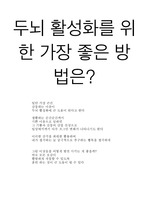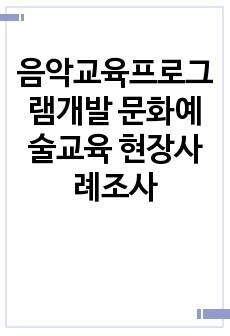The effects of music listening, autogenic training, and music-assisted autogenic training on the quality of life, relaxation responses, and daily living of migraine patients
(주)학지사
- 최초 등록일
- 2015.03.24
- 최종 저작일
- 2005.01
- 19페이지/
 어도비 PDF
어도비 PDF
- 가격 4,800원

* 본 문서는 배포용으로 복사 및 편집이 불가합니다.
서지정보
ㆍ발행기관 : 한국음악치료교육학회
ㆍ수록지정보 : 인간행동과 음악연구 / 2권 / 1호
ㆍ저자명 : 이수연, MME, MT-BC
목차
Methods
Results
Discussion
한국어 초록
The purpose of this study was to investigate the effect of music listening, autogenic training, and music-assisted autogenic training on the quality of life, physiological and psychological relaxation responses, and daily living in a population of migraine patients. Forty migraine patients, ranging 20 to 60 years, were referred to the researcher by their physicians and participated in the study. A convenience control-group pretest-posttest design was employed. The participants were randomly assigned to one of four groups: music listening (ML), autogenic training (AT), music-assisted autogenic training (MAT), or a control group participants, with n = 10 participants per group. The participants in experimental groups received four 30-minute sessions with an assigned treatment, once a week during a 4-week experiment period. The participants in the control group continued their regular medical treatment as prescribed by the doctor without receiving any other relaxation treatment. However, they were still aware of the research and their responsibilities for the study. The Migraine Assessment (MIDAS) and Migraine-Specific Quality of Life (MSQOL) questionnaire were used to investigate a migraine patients' quality of life collected before and after the 4-week experiment for all subjects. The physiological and psychological relaxation responses of migraine patients were measured by relaxation levels and forehead temperature recorded before and after each treatment session for the participants in three treatment conditions. The effect of the relaxation treatments on daily living of migraine patients was examined through the frequency and intensity of migraine headaches, and the amount of medication taken for migraine headaches during the 4-week experiment as recorded in participants' diary for all participants. The results found significant differences from pre- to posttest on the MIDAS, MSQOL, and relaxation levels while no significant was found among the groups. The analysis of forehead temperature showed no significant difference from pre- to posttest and among the groups. A one-way ANOVA was performed on the frequency, intensity, and amount of medication taken for migraine headaches during the 4-week experiment period. While results yielded no significant difference among the groups, the data indicate that the participants in the three treatment groups reported fewer migraine headaches, lower degrees of headache intensity, and less medication taken for migraine headaches than participants in the control group. A conclusion drawn from this study is that music listening itself as a relaxation treatment, or as an adjunct to other relaxation techniques can be effective in the treatment of migraine headaches.
영어 초록
The purpose of this study was to investigate the effect of music listening, autogenic training, and music-assisted autogenic training on the quality of life, physiological and psychological relaxation responses, and daily living in a population of migraine patients. Forty migraine patients, ranging 20 to 60 years, were referred to the researcher by their physicians and participated in the study. A convenience control-group pretest-posttest design was employed. The participants were randomly assigned to one of four groups: music listening (ML), autogenic training (AT), music-assisted autogenic training (MAT), or a control group participants, with n = 10 participants per group. The participants in experimental groups received four 30-minute sessions with an assigned treatment, once a week during a 4-week experiment period. The participants in the control group continued their regular medical treatment as prescribed by the doctor without receiving any other relaxation treatment. However, they were still aware of the research and their responsibilities for the study. The Migraine Assessment (MIDAS) and Migraine-Specific Quality of Life (MSQOL) questionnaire were used to investigate a migraine patients' quality of life collected before and after the 4-week experiment for all subjects. The physiological and psychological relaxation responses of migraine patients were measured by relaxation levels and forehead temperature recorded before and after each treatment session for the participants in three treatment conditions. The effect of the relaxation treatments on daily living of migraine patients was examined through the frequency and intensity of migraine headaches, and the amount of medication taken for migraine headaches during the 4-week experiment as recorded in participants' diary for all participants. The results found significant differences from pre- to posttest on the MIDAS, MSQOL, and relaxation levels while no significant was found among the groups. The analysis of forehead temperature showed no significant difference from pre- to posttest and among the groups. A one-way ANOVA was performed on the frequency, intensity, and amount of medication taken for migraine headaches during the 4-week experiment period. While results yielded no significant difference among the groups, the data indicate that the participants in the three treatment groups reported fewer migraine headaches, lower degrees of headache intensity, and less medication taken for migraine headaches than participants in the control group. A conclusion drawn from this study is that music listening itself as a relaxation treatment, or as an adjunct to other relaxation techniques can be effective in the treatment of migraine headaches.
참고 자료
없음

























